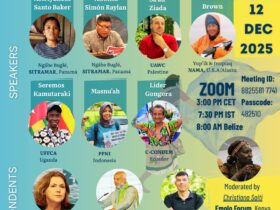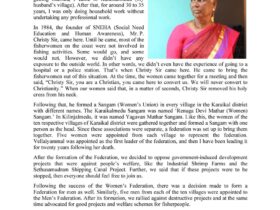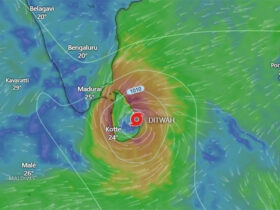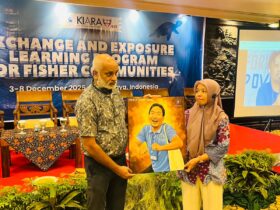Workshop Statement on: “Social Dimensions Of Marine Protected Area Implementation In India: Do Fishing Communities Benefit?”
Made at: 21 To 22 January 2009. Image Auditorium, Chennai.
We, representatives of artisanal and small-scale fishworker organizations, organizations in support of fishworkers, environmental groups, and the scientific community, committed to equitable and socially-just conservation, use and management of coastal and marine living resources, having participated in the workshop on “Social Dimensions of Marine Protected Area Implementation in India: Do Fishing Communities Benefit?” in Chennai from 21 to 22 January 2009;
Conscious of the importance of fisheries and of the high dependence of millions of fisherpeople on fisheries, and of the fact that that marine and coastal ecosystems are rich spawning and breeding grounds, and provide vital coastal protection benefits;
Being concerned about the livelihood problems encountered by at least ten per cent of the active marine fisher population of India from unfair restrictions on their fishing operations in the course of implementing marine and coastal protected areas, such as the Gulf of Mannar National Park, Tamil Nadu; the Gahirmatha (Marine) Wildlife Sanctuary, Orissa; the Gulf of Kutch Marine National Park and Sanctuary, Gujarat; the Sundarban TigerReserve, West Bengal; and the Malvan (Marine) Wildlife Sanctuary, Maharashtra;
Being further concerned that non-fishery activities that have a destructive environmental and ecological impact on marine and coastal protected areas, such as indiscriminate pollution and habitat degradation from industrial activities, are not being regulated, and that fishing communities are, therefore, disproportionately bearing the costs of conservation measures;
Being aware of the importance of effectively addressing livelihood and occupational interests of fishing communities, living in and around marine and coastal protected areas, within the framework of an integrated approach to conservation, use and management of coastal and marine living resources;
Do hereby recommend:
(1) Integrate fundamental principles of participation, environmental justice, social justice, and human rights into the implementation of marine and coastal protected areas
Full and active participation of fishing communities in decision-making at all stages of marine and coastal protected area identification, planning, designation, implementation, review and evaluation should be ensured, in policy, law and practice, to meet both social and conservation objectives, drawing upon good practices within and outside India;
Fishing communities should be considered as allies, and community-led initiatives for management and conservation should be recognized and supported; diverse, participatory and site-specific approaches for the conservation and management of coastal and marine resources, should be promoted;
Fishing rights of small-scale fishers using sustainable fishing gear and practices should be protected. Should fishing activities be regulated, adequate compensation should be provided, and a systematic and participatory approach for enhancing and diversifying livelihoods of affected communities should be adopted;
Implementation of existing marine and coastal protected areas should be reviewed on an urgent basis, in the light of principles of participation, environmental justice, social justice, and human rights, with a view to addressing issues facing fishing communities in these areas;
New marine and coastal protected areas should be considered only after transparent mechanisms, incorporating principles of participation, environmental justice, social justice, and human rights, for designating and managing such areas, are established;
(2) Address threats to coastal and marine ecosystems from non-fishery sources
Stringent measures to prevent pollution and degradation of marine and coastal habitats from non-fishery sources such as ports, shipping lanes, tourism development and other related activities, within and outside the protected areas, should be adopted; and, existing legal provisions should be strictly implemented;
(3) Enforce marine fishing regulation act in all the states and union territories
Effective implementation of marine fishing regulation acts in territorial waters, particularly enforcement of non-mechanized fishing zones, mesh size regulation and the regulation of destructive fishing gear and practices, such as use of explosives, bottom trawling and purse- seining, should be ensured to improve fisheries conservation and management in territorial waters. Co-management arrangements should be considered to improve the effectiveness of fisheries management;
(4) Adopt legislation to conserve and manage living resources of the EEZ
An effective conservation and management regime for living resources, including fisheries, of the entire Indian exclusive economic zone (EEZ) should be developed through a participatory process. In this context, reviewing, amending and strengthening relevant legislation, including the marine fishing regulation acts, and adopting an environmental action plan for fisheries, setting out measures that can be used towards conservation and management of fisheries resources, should be considered;
(5) Adopt an integrated approach for the management of coastal and marine living resources
Collaboration and coordination, in particular, between the Ministry of Agriculture and the Ministry of Environment and Forests at the national level, and between departments of fisheries and forests at the State level, should be improved. Better cross-sectoral coordination between relevant ministries with jurisdiction over the coastal and marine space, and between research institutions and non-governmental organizations, should be established. In conclusion, we urge recognition of the need for an integrated and participatory framework for conservation, use and management of marine and coastal living resources that secures the preferential access rights of fishing communities to coastal and fishery resources. This should be consistent with India’s obligations and commitments under the 1948 Universal Declaration of Human Rights (UDHR), the 1982 United Nations Convention on the Law of the Sea (UNCLOS), the 1995 FAO Code of Conduct for Responsible Fisheries (CCRF), the 1992 Convention on Biological Diversity (CBD), and the United Nations Millennium Development Goals (MDGs).
Signatories
Organizations
- National Fishworkers’ Forum
- Malvan Taluka Shramik Machhimar Sangh, Maharashtra
- Sundarban Fishermen’s Joint Action Committee, West Bengal
- Ramnad District Fishworkers’ Trade Union, Tamil Nadu
- Vangakadal Meen Thozhilalar Sangam, Tamil Nadu
- Orissa Traditional Fishworkers’ Union (OTFWU), Orissa
- International Collective in Support of Fishworkers (ICSF)
- South Indian Federation of Fishermen Societies (SIFFS)
- Kalpavriksh
- Greenpeace India
- DHAN Foundation
- Dakshin Foundation
- Action for Food Production (AFPRO)
- Integrated Coastal Management (ICM)
- WWF India
- Project Swarajya, Orissa
- SETU Information Centre, Kutch, Gujarat
- Group for Nature Preservation and Education(GNAPE), Tamil Nadu
- Protsahan, Kerala
- Direct Initiative for Social and Health Action (DISHA), West Bengal
- Fisherfolk Foundation, Andhra Pradesh
Individuals
- Dr. Kartik Shanker, Indian Institute of Science and Dakshin Foundation, Bangalore
- Dr. BC Choudhury, Professor, Wildlife Institute of India, Dehradun
- Dr. Ashaletha, Senior Scientist, Central Institute of Fisheries Technology (CIFT), Kochi
- Dr. V. Sampath, Ex-Adviser, Ministry of Earth Sciences, Government of India
- Mr. Sanjay Upadhy, Advocate, Supreme Court and Honorary Managing Trustee, Environment Law and Development Foundation, New Delhi
- Ms. M. Rachel Pearlin , Citizen Consumer and Civic Action Group (CAG), Tamil Nadu
- Mr. Manish Chandi, Research Associate, Andaman and Nicobar Islands Environmental Team (ANET) and Research Affiliate, Nature Conservation Foundation (NCF), Karnataka





Leave a Reply